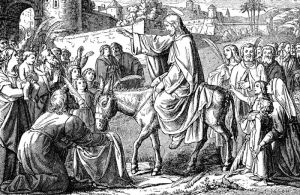Christian-History.org does not receive any personally identifiable information from the search bar below.
The Lord's Day: Sabbath or Sunday
The earliest reference we have to the Lord's day, besides the vague comment made in the Book of Revelation (1:10), is in the letter to the Magnesians written by Ignatius of Antioch in A.D. 110:
 Jesus' triumphal entry into Jerusalem
Jesus' triumphal entry into JerusalemIf those who have been brought up in the ancient order of things [i.e., converted Jews] have come to the possession of a new hope, no longer observing the Sabbath but living in observance of the Lord's day, on which also our life has sprung up again by him and his death …
The Lord's day is the day on which "our life has sprung up again by him." In other words, it is the day of Jesus' resurrection, the first day of the week.
The Letter of Barnabas, written not long afterward, explains further:
[God] says to them, "Your new moons and Sabbaths I cannot endure." You understand what he's saying. Your present Sabbaths are not acceptable to me, but the Sabbath I have made is. When I give rest to all things, I shall make a beginning of the eighth day; that is, a beginning of another world. Therefore we keep the eighth day with joyfulness, the day also on which Jesus rose from the dead. (ch. 15)
Barnabas goes on to say that 'keeping the day' means being pure in heart in all things rather than refraining from working, as the Jews do. Justin Martyr, writing around A.D. 150, concurs with Barnabas:
The new law requires you to keep perpetual Sabbath, and you [Jews], because you are idle for one day, suppose you are godly, not understanding why this command was given to you. (Dialogue with Trypho 12)
I have explained on another page that the early Church kept perpetual Sabbath. In other words, they sanctified each and every day by resting in Christ and living holy.
So in what manner did they "keep" the eighth day, which is the equivalent of the first day?
Ad:
Our books consistently maintain 4-star and better ratings despite the occasional 1- and 2-star ratings from people angry because we have no respect for sacred cows.
Observing the Lord's Day
Ignatius has told us that we ought to "observe" the Lord's day, and Barnabas has told us that the early Christians "keep" that day. In what way did they do this?
The key is in Barnabas' comment that they kept the eighth day "with joyfulness."
The first day was the day upon which Christ rose. Therefore it was to be celebrated. Tertullian tells us that it was considered unlawful to fast or kneel on the Lord's Day. Clement adds that a person keeps the Lord's day when he "abandons an evil disposition."
When the Lord's day is not dragged into a controversy over the Sabbath, it is very simple to understand. It was the day upon which Christ rose, and the early church celebrated it by by not kneeling or fasting upon that day. It was also the day of their primary Christian meeting, as Justin Martyr points out:
And on the day called Sunday, all who live in cities or in the country gather together in one place, and the memoirs of the apostles or the writings of the prophets are read, as long as time permits; then, when the reader has ceased, the president verbally instructs, and exhorts to the imitation of these good things. Then we all rise together and pray, and, as we before said, when our prayer is ended, bread and wine and water are brought, and the president in like manner offers prayers and thanksgivings, according to his ability, and the people assent, saying Amen; and there is a distribution to each, and a participation of that over which thanks have been given, and to those who are absent a portion is sent by the deacons. And they who are well to do, and willing, give what each thinks fit; and what is collected is deposited with the president, who assists the orphans and widows and those who, through sickness or any other cause, are in want, and those who are in bonds and the strangers sojourning among us, and in a word takes care of all who are in need. But Sunday is the day on which we all hold our common assembly, because it is the first day on which God, having wrought a change in the darkness and matter, made the world; and Jesus Christ our Saviour on the same day rose from the dead. For He was crucified on the day before that of Saturn (Saturday); and on the day after that of Saturn, which is the day of the Sun, having appeared to His apostles and disciples, He taught them these things, which we have submitted to you also for your consideration. (First Apology 67)
For further discussion of the Sabbath, you can go to the Sabbath page.
Early Church History Newsletter
You will be notified of new articles, and I send teachings based on the pre-Nicene fathers intermittently.
When you sign up for my newsletter, your email address will not be shared. We will only use it to send you the newsletter.
